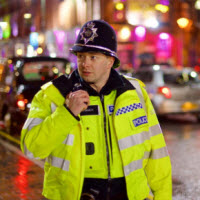Tory conference police force admits sharing information on protesters with DWP
Disabled activists have demanded an inquiry after a police force that has patrolled four Conservative party conferences since 2010 admitted sharing information about protesters with the Department for Work and Pensions (DWP).
Greater Manchester Police (GMP) has now become the second police force to admit sharing information about people taking part in protests with DWP, following a similar admission by Lancashire police.

But GMP has also admitted having a “sharing agreement” with DWP, even though the department explicitly stated two months ago that it had no such arrangements with any police force.
The admissions have followed claims reported by Disability News Service (DNS) that police forces have been targeting disabled protesters taking part in peaceful anti-fracking protests across England.
Lancashire police then admitted in December that it had shared both information and video footage of disabled anti-fracking protesters with DWP, in an apparent attempt to have their disability benefits removed.
Last month, DWP refused to say – in response to a DNS freedom of information request – which police forces had passed it information about claimants of disability benefits who have taken part in anti-fracking and anti-austerity protests.
But Greater Manchester Police has now told DNS that it passed DWP information – but not video footage – about protesters taking part in the anti-fracking protests at Barton Moss, Salford.
Those protests took place in 2013 and 2014, but the force also confirmed that it has shared information with DWP from protests not connected with fracking.
This raises concerns that it has passed information to DWP about disabled people who protested in Manchester about the government’s austerity-related social security reforms, particularly high-profile actions in 2015 and 2017.
In 2017, disabled activists from the Disabled People’s Direct Action Network (DAN) and Disabled People Against Cuts (DPAC) criticised “heavy-handed” police tactics at a direct action protest that blocked tram lines outside the conference.
The Tory party is due to return to Manchester in September for this year’s annual party conference.
Andy Greene, a member of DPAC’s national steering group, said: “Using the cover of suspected benefit fraud as a shroud for the targeting of disabled activists is outrageous.
“These are public services and should be deploying every resource they have to support disabled people to be active and engaged citizens.
“Yet, what we see is the use of those resources deployed against disabled people as if we are enemies of the state.
“Violence, the weaponisation of hunger, the ‘grave and systemic violations of disabled people’s human rights’ – this is what we are experiencing at the hands of the police, the DWP and other public services every day.”
He added: “There needs to be an inquiry into what’s gone on; and where wrong has been done, people have to be held to account.
“Who made the decisions within these services to share this information, when, how were these decisions justified?
“Disabled people need to be shown – not words – that they are safe to take part in protests, demonstrations, campaigning and activism without the threat of police violence or having their benefits and services taken away.
“The policing of disabled people by the very services designed to empower and enable us is a dangerous road to go down.”
Dennis Queen, who lives in Manchester and was arrested at the 2017 protest for public disorder but was later found not guilty, also backed calls for an inquiry.
She said she did not understand how the police could lawfully know who was claiming disability benefits.
She said: “In the same vein I don’t understand what business it is of the DWP if a person decides to attend a protest.
“As far as I am aware there are no questions in benefit claims about attending protests.
“There is no rule that claimants may not attend protests for us to be breaking. If there is then we ought to have a right to know about it.
“I can only assume this is being done to cause a chilling effect and make disabled people afraid to protest. As such, it’s an informal ban on protesting against disabled people.”
Three other police forces that have been involved in policing anti-fracking protests over the last six years – Sussex, Surrey and North Yorkshire – have told DNS that they have not passed on information about protesters to DWP.
A Greater Manchester Police spokesperson said in a statement: “As part of a sharing agreement, information about protestors has been passed to DWP but only in the event where concerns have been raised.
“During the course of our duties, whether this is at protests or not, if any concerns are identified, we are duty-bound to pass these onto the relevant partner agencies in any policing operation.
“No-one is deterred from taking part in protests or exercising their right to free speech.
“As with any operation, a strategy is put in place in order for us to facilitate peaceful protests with as little disruption to the local area as possible.
“The sharing of information is a useful tool for both us and our partners, helping us to build greater intelligence pictures, identify areas of concerns and work better with the communities we serve.”
A force spokesperson later added: “Information was passed to DWP in relation to the Barton Moss protests.”
She said that the raising of concerns that lead to information being passed to DWP are those “identified from intelligence gathering before all protests, reports made by the public and information passed on by police officers on the ground”.
The spokesperson also confirmed that information had been passed to DWP about both anti-fracking and non-fracking-related protests.
It is not yet clear which other protests have led to information being passed to DWP by Greater Manchester Police.
A DWP spokesperson said: “There is no formal arrangement in place between DWP and any police force for this or other similar scenarios.”
She had not said by noon today (Thursday) whether this meant her department was accusing Greater Manchester Police of lying about its “sharing agreement” with DWP.
She also refused to say if the minister for disabled people accepted that this exchange of information with GMP risked creating a more hostile environment for disabled people who receive benefits.
She also refused to say if Newton accepted that there would be grave concerns over the possible sharing of information with DWP by GMP from anti-austerity protests that were critical of DWP and its policies at Tory party conferences in Manchester.
Story source: John Pring at www.disabilitynewsservice.com



